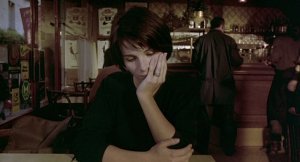Three Colours: Blue

|
In the first of the acclaimed Three Colours trilogy by Krysztof Kieślowski, Three Colours: Blue follows Julie (Binoche), a woman grieving the loss of her husband and young daughter in a car accident, which she managed to survive. As soon as the physical signs of the accident subside, Julie tries to free herself of any semblance of her family - burning her husband’s work, moving out of the family home, and cutting off most relationships with people she knew prior to the crash. Though there is a clear sadness to everything that Julie experiences, there is a beauty that seeps through it. Each frame is constructed like a pre-Raphaelite doused in blue paint, Juliette Binoche is perfect in capturing the flittering emotions of grief, of trying to root yourself in love when everyone you held dear is gone, of making the effort to do the menial tasks because to watch something as simple as a sugar cube in a coffee cup is to know that you are alive. Though there are slight references to Three Colours: White and Red, the other films in the trilogy, Blue stands on its own. It’s a testament to love, to music (something that aided by the fact there’s an exquisite soundtrack by Zbigniew Preisner), to beauty and a thousand other things that I probably can’t contain to a simple review.
Erin Lewis
The first of Kieslowski’s critically celebrated trilogy deals with the pursuit of liberty, as seen through the eyes of a young widow. Julie (Binoche) loses her husband Patrice, an acclaimed composer, and her young daughter Anna in a car crash. She seeks freedom and independence from the remnants of her former life, first through a thwarted suicide attempt while recovering in hospital and later by living quietly and anonymously in a small Parisian apartment.
Little by little, however, aspects of her past and present life intrude upon her solitude: her late husband’s mistress Sandrine (Pernel) and their unborn child, his last, unfinished work, and the needs and problems of her new neighbours. Patrice’s young assistant Olivier (Regent), inspired by his love for Julie, tries to draw her out of her isolation to finish the `Concerto for Europe’, whose incomplete fragments have attracted copious media speculation.
Although the three films of the trilogy stand alone, they dovetail elegantly, each centring around one of the three virtues embodied in the French tricolour. When Julie seeks out Sandrine at the law court where she works, the trial which she nearly interrupts is the divorce hearing with which `White’ begins.
Nick Jackson
When a composer and his young child are killed in a road accident his widow (Juliette Binoche) is left alone in the world, with little left to live for. She runs away, but is haunted by her husband's memory and is forced to face her loss.
The first in Kieslowski's trilogy, Blue is a haunting film about loss and music. Notable are Binoche's performance, understated but affecting, and the use of music (by Zbigniew Preisner) which brilliantly allows access to Binoche's emotions and memory. Music is rarely used to such effect. Rather than simply emphasizing what the viewer already knows, or providing something to distract the viewer from the gaping holes in the plot, Blue shows how music can, and should, be used. The film is truly cinematic, relying upon the visual and aural to communicate meaning, rather than relying upon literary methods to tell the viewer what is going on. Although Red was commonly voted the outstanding film of the trilogy, this reviewer found this film far more interesting and is at least as good as the final film. A film people that will be talking about in fifty years time.
Malcolm Cook
Showing as part of the Colours season - a tribute to the late Krzysztof Kieslowski, Three Colours: Blue, or "A Short Film about Music" will be followed on successive Tuesdays by White and Red.
More Information | Back to Previous Schedule | This Season | BBFC Classification Guidelines
Screenings of this film:
| 1996/1997 Autumn Term – (35mm) |
| 1999/2000 Autumn Term – (35mm) |
| 2023/2024 Spring Term – (35mm) |


